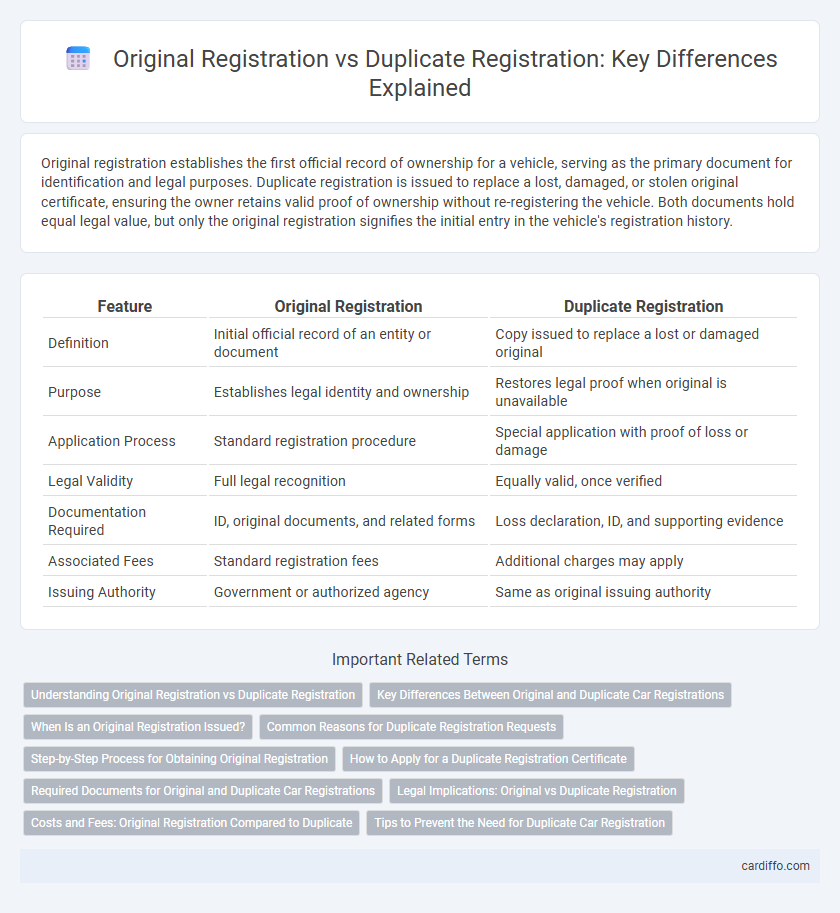Original registration establishes the first official record of ownership for a vehicle, serving as the primary document for identification and legal purposes. Duplicate registration is issued to replace a lost, damaged, or stolen original certificate, ensuring the owner retains valid proof of ownership without re-registering the vehicle. Both documents hold equal legal value, but only the original registration signifies the initial entry in the vehicle's registration history.
Table of Comparison
| Feature | Original Registration | Duplicate Registration |
|---|---|---|
| Definition | Initial official record of an entity or document | Copy issued to replace a lost or damaged original |
| Purpose | Establishes legal identity and ownership | Restores legal proof when original is unavailable |
| Application Process | Standard registration procedure | Special application with proof of loss or damage |
| Legal Validity | Full legal recognition | Equally valid, once verified |
| Documentation Required | ID, original documents, and related forms | Loss declaration, ID, and supporting evidence |
| Associated Fees | Standard registration fees | Additional charges may apply |
| Issuing Authority | Government or authorized agency | Same as original issuing authority |
Understanding Original Registration vs Duplicate Registration
Original registration refers to the initial process of recording a vehicle or property under a unique identification number, establishing its legal ownership and status in official records. Duplicate registration is issued when the original document is lost, damaged, or stolen, serving as a replacement that maintains the same identification details without altering ownership. Understanding the distinction helps ensure the validity of ownership proofs and prevents fraudulent activities in official registrations.
Key Differences Between Original and Duplicate Car Registrations
Original car registration serves as the initial proof of ownership issued when a vehicle is first registered, containing unique details like the vehicle identification number (VIN), owner's information, and registration date. Duplicate registration is a reissued document provided when the original is lost, stolen, or damaged, matching the original data without altering ownership or vehicle status. Key differences include the issuance purpose, with original registration establishing initial ownership, while duplicate is a replacement maintaining continuity of registration records.
When Is an Original Registration Issued?
An original registration is issued when a vehicle is registered for the first time with the Department of Motor Vehicles (DMV) or relevant authority. This process involves submitting proof of ownership, such as a title or bill of sale, and completing required inspections or emissions tests. Duplicate registrations are issued only when the original registration card is lost, stolen, or damaged, serving as a replacement without altering the vehicle's registration status.
Common Reasons for Duplicate Registration Requests
Duplicate registration requests commonly arise due to lost or damaged original registration documents, changes in ownership requiring proof of updated details, or errors in the initial registration that need correction. Vehicle owners often seek duplicates when the original registration card is misplaced during relocation or stolen, necessitating a replacement to ensure legal compliance. Administrative updates, such as changes in address or personal information, also prompt duplicate registration to maintain accurate records with motor vehicle departments.
Step-by-Step Process for Obtaining Original Registration
Obtaining original registration involves submitting a completed application form with proof of ownership, identity, and address to the relevant registration authority. The process typically requires vehicle inspection, payment of applicable fees, and verification of documents before the issuance of the official registration certificate. Duplicate registration, by contrast, is requested only if the original is lost or damaged, often requiring an affidavit and a formal application.
How to Apply for a Duplicate Registration Certificate
To apply for a duplicate registration certificate, submit a formal application to the relevant registration authority, often the state's Department of Motor Vehicles or equivalent agency, citing reasons such as loss, theft, or damage of the original registration. Provide essential documents including proof of identity, ownership, and a completed affidavit stating the circumstances of the original certificate's unavailability. Pay the prescribed duplicate registration fee and follow any specific procedural requirements set by the local jurisdiction to complete the process efficiently.
Required Documents for Original and Duplicate Car Registrations
Original car registration requires the vehicle title, proof of identity, proof of address, insurance documents, and a completed application form, ensuring the vehicle is legally registered for the first time. Duplicate registration mandates submitting a copy of the original registration certificate, a valid ID, proof of address, and a completed application to replace a lost, stolen, or damaged registration. Both processes may involve paying applicable fees and providing vehicle inspection reports depending on regional regulations.
Legal Implications: Original vs Duplicate Registration
Original registration serves as the primary legal document validating ownership and authenticity of a property or asset, establishing clear title and priority in legal disputes. Duplicate registration, issued to replace lost or damaged originals, holds the same legal validity but may require additional verification to prevent fraud or misuse. Courts recognize both documents' legitimacy, yet original registrations typically carry greater evidentiary weight in ownership conflicts.
Costs and Fees: Original Registration Compared to Duplicate
Original registration typically involves higher costs and fees due to initial processing, issuance of official documents, and administrative charges. Duplicate registration fees are generally lower, covering only the reissuance of lost or damaged documents without full processing costs. Understanding the fee structure for original versus duplicate registration helps manage expenses during vehicle or property record management.
Tips to Prevent the Need for Duplicate Car Registration
Ensure accurate information submission during the original car registration process to avoid discrepancies that may necessitate a duplicate registration. Store the vehicle registration certificate securely and make digital backups to prevent loss or damage that leads to requesting duplicates. Regularly update contact details with the vehicle registration authority to receive timely notifications and avoid administrative delays requiring duplicate documentation.
Original Registration vs Duplicate Registration Infographic

 cardiffo.com
cardiffo.com